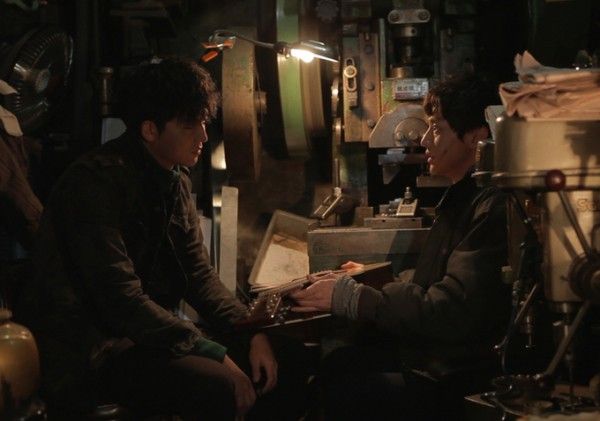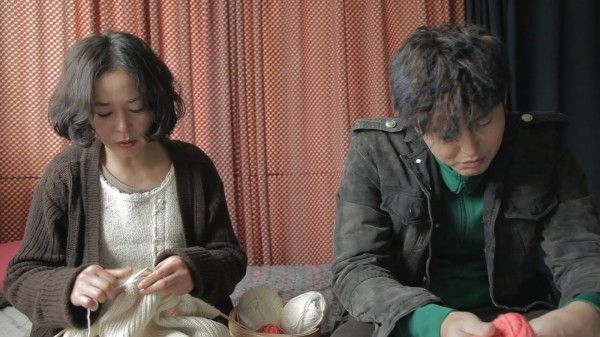The films of prolific South Korean director Kim Ki-duk have delved into some of the ugliest sides of human nature, as well as some of the divine. He's an auteur capable of being both grotesquely controversial (The Isle) and peacefully introspective (Summer, Fall, Winter...and Spring). The sharp divide in style and themes meets head-on in his new film, Pieta, a challenging tale of revenge and motherly love that knows no boundaries. Not even the gross ones. The film won the Golden Lion at last year's Venice International Film Festival and now its hitting the States. Proceed past the jump for my review of Kim Ki-duk's Pieta.
Kang-do (Lee Jung-jin) is a crafty debt collector in the small industrial slum of Cheonggyecheon, where he has a devilishly effective racket going on. When a debtor is unable to pay, Kang-do forces them to sign an insurance policy that pays out if the person becomes disabled. The loss of a hand, for instance, is worth $30K. After they sign, he cripples them in a myriad of gruesome manners. Most of the debtors work in small machine shops, so the brutality typically involves some kind of mechanical apparatus. One guy, who must be a particularly cheap pain in the ass, Kang-do makes jump out of a building, then he stomps on his broken leg for good measure. Although most of the violence happens offscreen, it doesn't make it any easier to watch.
As he weaves this savage trail of human degradation through Cheonggyecheon, Kang-do remains steadfastly unsympathetic. He's almost robotic in his actions as cries for mercy bounce off his iron-clad exterior. When one debtor's wife offers her body up as barter, Kang-do just slaps her and goes about his business taking out the guy's limb. He's so barbaric he leaves chicken entrails on his bathroom floor like some kind of sadistic decor! The only hint of humanity in this ice cold character is that he masturbates in the first scene. I guess even he has to get his rocks off in between crippling poor folk.
His violent routine is one day interrupted by a solemn older woman (Cho Min-soo) who claims to be his long-lost mother. Kang-do doesn't is skeptical and continues his warpath despite this annoying woman who keeps getting in his way. She brings food to his door and even delivers an unsolicited kick to one of his disabled victims. After forcing her way into his apartment and refusing to leave, she starts furiously scrubbing dishes like the damn holding back her maternal instincts has burst. In order to "prove" that she's his mother, Kang-do subjects her to a series of wildly horrific tests. You know what they always say: only a mother's love can endure cannibalism and pseudo-incestual rape.
Kang-do begins to form a loving connection with the woman and eventually this warmth permeates into his work. The presence of the woman sparks a bit of mercy in the ruthless debt collector. When one older debtor welcomes his punishment, stating he was happy to spend the money then die, Kang-do allows him the dignity of suicide. Another man willfully offers both hands to be maimed if he can get another loan to support his family. Kang-do is envious of this man's love for his child and shows him compassion. There are plenty of movies about tough guys turning soft, but the relentless bleakness of these benevolent moments in Pieta is more unsettling than heartwarming.
While he transitions into a big softie, the film never gives up on the overall feeling of dread and sadness that only increases as the actual motive of the woman is gradually revealed. Cinematographer Jo Young-Jik aptly frames the film with consuming darkness - even exterior daytime scenes have a atmosphere of claustrophobia. The physical world of Pieta closes in on Kang-do while his regret and guilt devours him from within. These feelings of remorse consume him so slowly that their devastation is way more effective and believable than an act of physical violence.
The film takes its name from Michelangelo's sculpture of the Virgin Mary nestling a dying Jesus and just like the J-man did, people die for Kang-do's sins. The final twists are executed with masterful precision and will surely emotionally haunt most viewers who can wisely look past the scenes of perversion and brutality. Pieta is a darkly stunning and expertly crafted film that won't be easily shaken from your guts. South Korea is known for its epic revenge films, but there's never been one quite as visually and thematically poetic as Pieta.
Pieta gets released on VOD and iTunes this Friday




